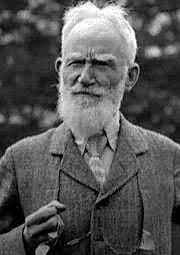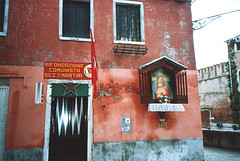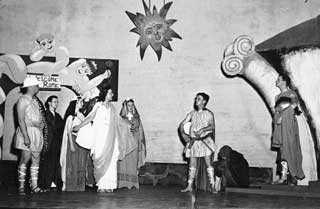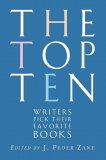When I left for college, I was a devout Christian. More precisely, I was a zealot. My goal was to obtain an education firmly rooted in both religion and Latin American cultural history (and to learn Spanish) so that, like other Mennonite brethren before me, I might become a Christian missionary to Central and South America.
The first book we were assigned to read for our freshman seminar was George Bernard Shaw’s Pygmalion. Willamette mailed each incoming freshman a copy of the play during the summer.  That fall, before the upperclassmen had returned to campus, we were introduced to the rigors of college life by dissecting Shaw.
That fall, before the upperclassmen had returned to campus, we were introduced to the rigors of college life by dissecting Shaw.
Yesterday I read Shaw’s Man and Superman, ostensibly a play but more of a social and philosophical commentary. In fact, I’m hard-pressed to say exactly what Man and Superman is. It demands re-reading.
Shaw uses his work to espouse his social agenda: socialism, women’s sufferage, Darwinism, etc. Man and Superman is no exception. In fact, there is a prolonged digression in the third act in which Don Juan and the Devil argue over social issues. A primary theme here is Shaw’s conception of a ‘Life Force‘, which seems to be a kind of cultural Darwinism, a force that causes human civilization (and, to a degree, humans at a physical level) to be constantly ‘advancing’. (It seems to me that Shaw is one of those that misuses the word ‘evolution’ to mean ‘advancement’ where evolution really means nothing of the sort. He seems to view each evolutionary step as some sort of progression to a higher stage.) It is, in some ways, a substitute for God.
As I say, I’m going to have to reread Man and Superman. I’m afraid I missed the forest, though I was able to see the trees.
It’ll have to wait, though, because I’ve started Shaw’s Androcles and the Lion in the meanwhile. This play is not much of a play. By that I mean that only 41 of the 158 pages in the work are devoted to the actual stage production. The rest, it seems, are devoted to Shaw’s interpretation of the New Testament gospels and their implication on socialism and communism.
Shaw wrote extensive prefaces to his works, and these are generally considered to be integral to the plays themselves. In this case, I’m willing to wager that the preface is the work, and that the drama for which it is written is secondary.
In any event, I find this preface fascinating. As I mentioned earlier, when I left for college I was a devout Christian. I was also a budding communist, and I believed that communism was the only socio-economic system compatible with Christ’s teachings. Though I had arrived at this belief independently, I soon found many others had reached the same point before me. Somehow, I never managed to find Androcles and the Lion or George Bernard Shaw.
Though I’m only two-thirds finished with the preface to Androcles and the Lion, what I’ve seen has convinced me that if I had read this when still young and impressionable, it would have further solidified my beliefs. Here, in his ever-articulate style, displaying wit and erudition, Shaw is able to describe the communist-Christian connection that I once believed (and still believe) so obvious.
It has always amazed me that American Christians are violently opposed to communism and ardently in favor of capitalism. I’m not sure how they reconcile their religion and their socio-economic system; I’ve never attempted to have a conversation with anyone on the subject, even when I was a communo-Christian.
The most interesting part of Shaw’s discussion in Androcles and the Lion is his exploration of how a redistribution of wealth ought to be implemented, if it should be implemented at all. He believes — or believed in 1916 — that the inequitable distribution of wealth is obvious, and that there is little argument that something must be done. But he finds it difficult to determine precisely what this something is. (Of course, I’ve still got thirty or forty pages left in the preface — perhaps he actually arrives at what he considers a good solution for redistribution.) This is fascinating.
He argues that distributing to each person according to that person’s need (or merit) is impractical; who is to determine the need (or merit)? The decision is subjective. I might think that you need 100 units of currency, while you think that you merit 250 units of currency. Who is right? How is this to be determined? (You can see how he’s skirting the issue of capitalism and market-determined wages/prices. This is essential, I think, because just as the world has never seen a pure communist system, it has never seen a pure capitalist system. What the United States has today is not capitalism, but some bastardized version of capitalism.) To this point, Shaw seems to be saying that each person should be allocated enough to subsist. In common parlance, he argues that each person should be allocated a living wage. What happens to the remainder of the capital after this living wage has been assigned everyone? (Because there will be capital remaining.) Well, I’m not sure — I haven’t reached that point yet.
Shaw is careful to note that an important factor in a system of redistribution is coping with ‘idlers’, those what will not carry their share of the load. He has not discussed this in depth yet, and I don’t know if he will, but he does make it clear that idlers are a factor that must be considered in any communist system.
I’m no longer a communist, just as I’m not longer a Christian. I don’t subscribe to many creeds.  I’ve seen too much and read too much, so that I have come to believe that everything is cloaked in shades of grey. Every viewpoint has some credence. There is little in this world that is absolute. There are some aspects of communism that seem fair and just. There are some aspects of capitalism that are fair and just. Which is better? Who is to say? How do you measure better? The Left can tell you that you measure it in one way, while the Right will tell you that you measure it in another way. I will say that I am pleased to live in the United States, where I am allowed a great deal of freedom and am able to provide for myself if that’s what I desire. However, I also recognize that as a white male, I am afforded opportunity that is not available to all members of this society.
I’ve seen too much and read too much, so that I have come to believe that everything is cloaked in shades of grey. Every viewpoint has some credence. There is little in this world that is absolute. There are some aspects of communism that seem fair and just. There are some aspects of capitalism that are fair and just. Which is better? Who is to say? How do you measure better? The Left can tell you that you measure it in one way, while the Right will tell you that you measure it in another way. I will say that I am pleased to live in the United States, where I am allowed a great deal of freedom and am able to provide for myself if that’s what I desire. However, I also recognize that as a white male, I am afforded opportunity that is not available to all members of this society.
 That fall, before the upperclassmen had returned to campus, we were introduced to the rigors of college life by dissecting Shaw.
That fall, before the upperclassmen had returned to campus, we were introduced to the rigors of college life by dissecting Shaw.
 I’ve seen too much and read too much, so that I have come to believe that everything is cloaked in shades of grey. Every viewpoint has some credence. There is little in this world that is absolute. There are some aspects of communism that seem fair and just. There are some aspects of capitalism that are fair and just. Which is better? Who is to say? How do you measure better? The Left can tell you that you measure it in one way, while the Right will tell you that you measure it in another way. I will say that I am pleased to live in the United States, where I am allowed a great deal of freedom and am able to provide for myself if that’s what I desire. However, I also recognize that as a white male, I am afforded opportunity that is not available to all members of this society.
I’ve seen too much and read too much, so that I have come to believe that everything is cloaked in shades of grey. Every viewpoint has some credence. There is little in this world that is absolute. There are some aspects of communism that seem fair and just. There are some aspects of capitalism that are fair and just. Which is better? Who is to say? How do you measure better? The Left can tell you that you measure it in one way, while the Right will tell you that you measure it in another way. I will say that I am pleased to live in the United States, where I am allowed a great deal of freedom and am able to provide for myself if that’s what I desire. However, I also recognize that as a white male, I am afforded opportunity that is not available to all members of this society.
